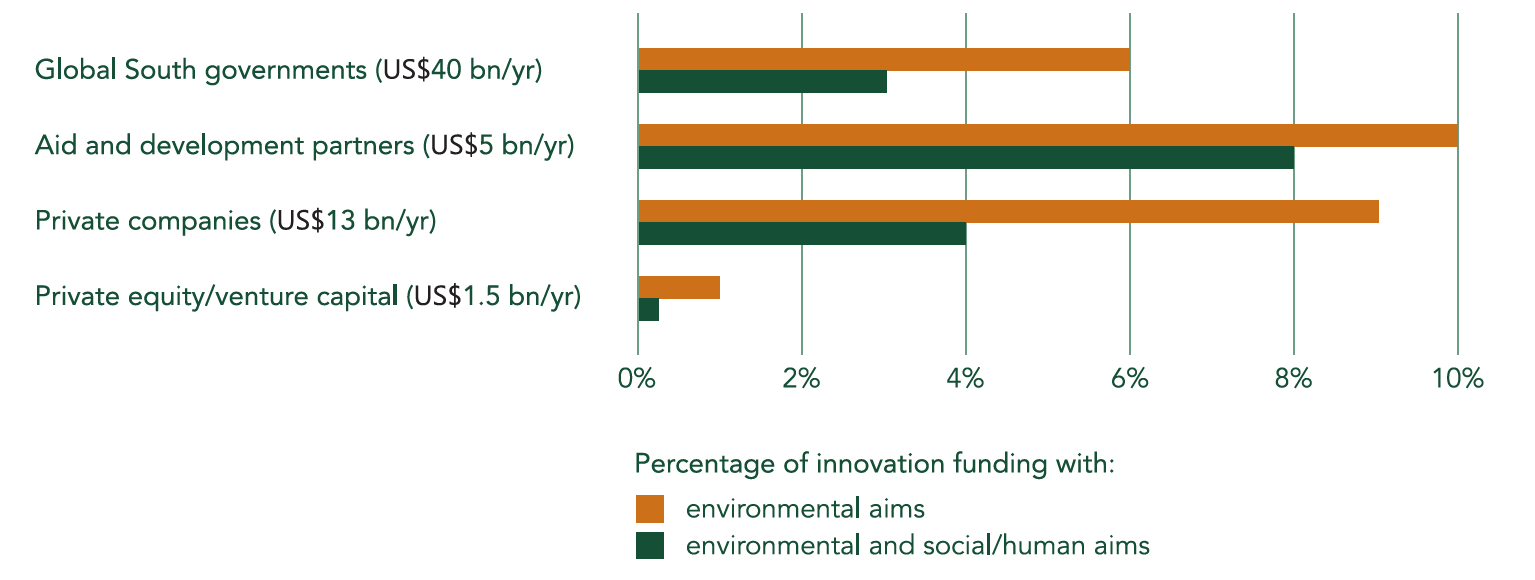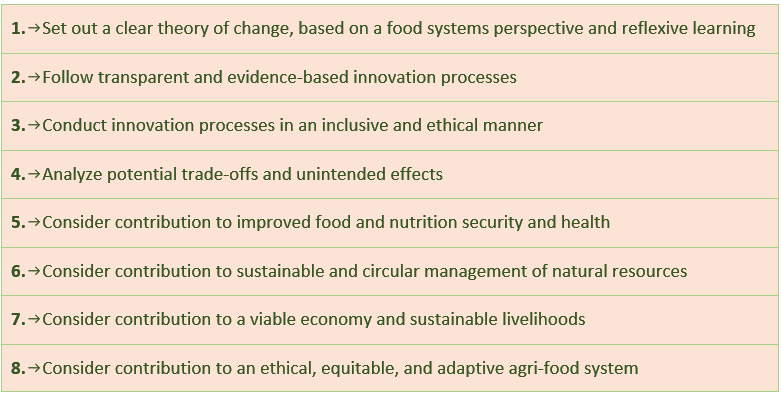Achieving global food security, alongside other Sustainable Development Goals, will not be possible without massive increases in investment in agrifood research and innovation. Innovation is needed in policy, social institutions, finance, and technology. Crucial areas of agrifood innovation are under-funded, including reducing food waste and producing nutritious food sustainably.
Transparent tracking of research and innovation can highlight gaps in coverage, incentivize public and private investors to prioritize innovation that delivers global goals, and overcome constraints to uptake.
We propose that the G20 provide pooled funding to a global multi-stakeholder agrifood research and innovation tracker, which will report results regularly to G20 Ministers and other policy-makers.
Challenge
Why is agrifood innovation important?
Food systems everywhere are facing major new challenges. Shocks caused by COVID-19 have currently seized our attention, but the pandemic has also accentuated persistent problems of poverty, hunger and malnutrition, population growth, and pressure on natural resources—notably land, water, and biodiversity. Climate change also poses a serious threat to food security and livelihoods: changing temperatures, highly variable precipitation, shifting growing seasons, and extreme weather events are already making agricultural yields and prices more volatile, with rural areas across the world feeling the effects. Yet, as the world’s population moves toward 9-10 billion by 2050, unprecedented increases in global food production—at least 60 percent over 2005–2007 level—will be needed to meet growing demand (Sulser et al. 2021).
Research and innovation is essential to address these multiple challenges and to ensure inclusive access to food and decent livelihoods for future generations. Innovation will be needed in agricultural technologies (e.g., crop varieties, biodegradable packaging) to increase and diversify agrifood value chains in ways that make more efficient use of resources. It will also be needed in the infrastructure, finance, social institutions, and services that support food systems in order to make them more inclusive, resilient, and sustainable (Herrero et al. 2020).
Why do we need to track agrifood innovation?
Current global investment in agrifood innovation is acknowledged to be insufficient. Estimates of the “investment gap” (additional money needed) range from USD 15 billion per year for the Global South (International Food Policy Research Institute 2021) to nearly USD 70 billion per year to adapt agricultural systems to climate change (Baldos, Fuglie, and Hertel 2020).
Moreover, critical issues remain neglected. Chronic under-investment in innovation for nutritious crops, such as vegetables and legumes, is one example (Pingali and Sunder 2017). Food loss and waste and natural resources management are also under-funded (Cattaneo et al. 2021). A recent study (Dalberg Asia 2021) found that only a small fraction of agrifood innovation funding for the Global South had tangible environmental and social objectives (Figure 1).
Figure 1 Less than 10% of innovation funding for the Global South has ‘sustainability’ aims, across all funder types

Source: CoSAI (2021)
Tracking research and innovation is essential, both to identify key areas of under-investment and lack of capacity, and to tackle constraints to innovation uptake, including public policy. Transparent tracking can also incentivize public and private sector investors to focus on developing sustainable innovations that support agreed global goals.
Demand for tracking agrifood innovation is coming both from international processes (e.g., as part of the Glasgow Breakthroughs agreed at COP26) and national and regional bodies. Policymakers, research managers, donor organizations, and other stakeholders need reliable and up-to-date quantitative data to identify key gaps, set investment priorities, promote efficient resource use, and ensure effective coordination and coherence.
Proposal
Introduction
This policy brief proposes a global multi-stakeholder tracking hub that would synthesize data on investments in agrifood innovation and subsequently track innovations and their uptake. The hub would also commission analysis and studies using the data, and report regularly on key issues in agrifood innovation to the G20 and other policy-makers and funders of research and innovation. The Food and Agriculture Organization of the United Nations (FAO) is an example of one institution that could potentially lead the hub. It is proposed that the G20 would play a crucial part in financially supporting the tracking hub and also as an actively engaged user of the information generated, requesting the analyses needed by G20 public and private sectors.
Building on existing research tracking
The new tracker would build on the existing tracking work of several organizations, listed in Box 1. These organizations currently produce some excellent practical analysis of innovation trends and studies on specific issues such as gender and innovation.
Box 1 A multistakeholder innovation tracking hub would build on existing R&D tracking initiatives
The need for tracking agrifood research and development (R&D) has long been recognized and some initiatives already exist. Among the most prominent are:
- the CGIAR/International Food Policy Research Institute (IFPRI) Program on Agricultural Science and Technology Indicators (ASTI) collects data on agricultural research investment, capacity, and outputs in the Global South.
- the Organization for Economic Cooperation and Development (OECD) compiles science, technology, and innovation metrics for a wide range of economic areas in high-income and emerging economies, including agriculture.
- International Science & Technology Practice & Policy (InSTePP) engages in in-depth economic research on science and technology practice and policy, and develops methods and tools for evaluating the economic effects of R&D.
- the Food and Agriculture Organization of the United Nations (FAO) and the World Bank maintain large global datasets on agricultural production, food security, trade, and environmental indicators.
- the United Nations Education, Scientific and Culture Organization (UNESCO) tracks data on R&D expenditures and R&D personnel for many countries on an annual basis.
- the World Intellectual Property Organization (WIPO) tracks a range of general innovation indicators in an annual Global Innovation Index.
- Private sector networks such as the World Business Council for Sustainable Development (WBCSD).
Examples of policy-focused analyses include Alston, Pardey, and Rao (2020); Beintema (2020); Dehmer et al. (2019); Hurley et al. (2016); International Food Policy Research Institute (2021); OECD (2019) and Beintema, Pratt, and Stads (2020).
However, the current fragmented tracking system has limitations, which a central tracking hub would help to overcome (CoSAI 2021). These limitations include:
- Nearly all current data relates to scientific and technical research and development (R&D). The new hub would aim to extend this to other types of innovation—such as in finance and business practices.
- Most current coverage lacks detail. For example, there is little information about specific topics or types of innovation (Dalberg Asia 2021). Some countries are poorly covered. Private sector data is particularly patchy. The new hub would remedy this gap.
Finally, a central tracking hub would harmonize definitions and metrics, as well as cleaning and curating data according to common standards. These technical tasks are essential to allow data from different sources and countries to be compared and aggregated.
The potential role of FAO-ATIO
The Food and Agriculture Organization of the United Nations (FAO) is currently considering a proposal for an Agrifood System Technologies and Innovations Outlook (ATIO) and a broader Science, Technology and Innovations (STI) Platform, with the objective to help inform policymakers as well as investors—especially in low- and middle-income countries—about the present state and near-to-medium-term outlook for agrifood systems science, technology and innovation around the world. The STI Platform and ATIO could be an excellent institutional home for a global agrifood innovations tracking hub, building on FAO’s role as the specialized agency of the United Nations that leads international efforts to defeat hunger, provides an essential and neutral platform for exchange between countries, and collaborates closely with the G20 on these issues.
Types of data to be collected by the tracking hub
The tracking hub could potentially collect data on various stages and aspects of research and innovation. Decisions on the specific data to collect would be based on demand from the G20 and other policy-makers, along with collection costs and quality and useability of the data.
Possible data to collect include:
- External inputs to agrifood innovation: for example, allocation of funding and human resources.
- Enabling environment: education, intellectual property and other regulations.
- Innovations by farmers and other operators in agrifood systems
- Emergent and established innovations such as patents, surveys of uptake and use
The hub could perform a further important function by tracking the degree to which innovation investments address environmental sustainability, nutrition, social inclusion, and other global objectives. It is not easy to define what investments “count” as addressing these issues (Dalberg Asia, 2020), so in response a multi-stakeholder task force set up by the Commission for Sustainable Agriculture Intensification (CoSAI) developed a new set of Principles for Agrifood Innovation (Multistakeholder Task Force 2022). The Principles and their sub-Principles are used throughout the innovation trajectory to ensure that initial commitment to sustainability and inclusiveness aims is followed up with measured results. A simple scoring system assesses the degree to which each Principle has been put into practice. There are eight main Principles (Figure 2): four that cover innovation processes, and four that cover potential innovation outcomes. The Principles can help investors in innovation to actively consider and promote food security and the SDGs, and manage trade-offs between goals (Zurek et al. 2022). The Principles have been piloted and are currently being tried at scale by some research and innovation organizations. The hub could thus track their uptake and implementation.
Finally, tracking impacts of innovation at scale is also of great interest, but it is technically demanding and costly to demonstrate linkages between specific innovations and impacts such as income, nutrition, and greenhouse gas emissions (Stevenson, Macours, and Gollin 2018; Belcher and Hughes 2021). This is an area for further discussion.
Figure 2 Eight Principles for Agrifood Innovation

Source: (Zurek et al. 2022) Note that each Principle has more specific sub-Principles.
How data from the tracking hub will be used
Some proposed uses of the innovation tracking data include:
- Global, regional, and national analyses of gaps and priorities, to help investors understand how to better invest in research and innovation to promote food system transformation.
- Tracking progress on international commitments to supporting agrifood innovation, for example from the Glasgow breakthroughs (COP26), and the Agriculture Innovation Mission for Climate (AIM4C).
- Forward-looking analyses of additional inputs required to step up innovation, including infrastructure, skills, gender and diversity, and partnerships.
- Comparative analyses across countries of progress in innovation and achieving innovation outcomes at scale, with recommendations on overcoming policy and other constraints to uptake.
- Analyses of efficiency, coordination, and coherence in the international agrifood research and innovation architecture.
- Specific studies requested by policy-makers: for example, the implications for nutrition of current investments in research and innovation in a specific region. It is important that national stakeholders, including those from Low- and Medium-Income Countries as well as the G20, have a strong voice in shaping the design and the outputs of the tracking hub.
Quantitative data are essential for improving the crucial role of agrifood innovation in enhancing agricultural productivity, reducing post-harvest losses, trade, reducing poverty, and improving nutrition, particularly in the context of rapid population growth and climate change.
Recommendations for the G20
Agrifood research and innovation has been described as “slow magic” (Pardey and Beintema 2001), meaning that there is typically a long lag time to see results at scale, but with very high returns to investment. This means that agrifood innovation is an urgent and high-priority global investment for the coming few years, in order to reach global food security, other SDGs and climate targets over the medium term.
G20 countries fund the overwhelming majority of global public agrifood research and innovation (UNESCO 2021). Most global private sector agrifood research and innovation also takes place in companies based in G20 countries (Dalberg Asia 2021). G20 investment also is a major source of innovation in food-insecure countries outside the G20.
This policy brief calls on the G20 to request regular reports on global agrifood research and innovation, discuss the key policy findings with member states, and support commitments to investment and improvement of research and innovation at global, regional, and national levels. A multi-stakeholder hub for tracking global agrifood research and innovation could report regularly to G20 Ministers—especially, but not only, Ministers of Agriculture and Health. The data would inform both collective and national decisions on agrifood innovation, influencing public and private investment.
This policy brief further calls for the G20 to consider mobilizing long-term pooled funding to support the global agrifood innovation tracking hub and its policy-relevant analytical studies. One reason for the current patchy global coverage on agrifood research and innovation is that this has been left to the short-term and ad hoc support of individual funders—for example, IFPRI’s ASTI R&D tracker has been supported by nine different donors over the past twenty years. High quality global public goods like information require regular and predictable global support.
To conclude, we reiterate the urgency and importance of reorienting global patterns of investment in agrifood innovation in order to transform food systems to meet global food security and other Sustainable Development Goals. A global tracking hub for research and innovation is a critical contribution towards this reorientation, and merits G20 support and attention.
References
Alston, Julian M., Philip G. Pardey, and Xudong Rao. 2020. “The Payoff to Investing in CGIAR Research.” SOAR Foundation. https://supportagresearch.org/assets/pdf/Payoff_to_Investing_in_CGIAR_Research_final_October_2020.pdf.
Baldos, Uris Lantz C., Keith O. Fuglie, and Thomas W. Hertel. 2020. “The Research Cost of Adapting Agriculture to Climate Change: A Global Analysis to 2050.” Agricultural Economics 51 (2): 207–20. https://onlinelibrary.wiley.com/doi/abs/10.1111/agec.12550.
Beintema, Nienke M. 2020. “The Role of Women in Agricultural Research.” Briefing paper #1. ASTI in Retrospect. International Food Policy Research Institute (IFPRI). https://ebrary.ifpri.org/digital/collection/p15738coll2/id/133951.
Beintema, Nienke, Alejandro Nin Pratt, and Gert-Jan Stads. 2020. “Key Trends in Global Agricultural Research Investment.” ASTI Program Note. International Food Policy Research Institute (IFPRI). https://www.asti.cgiar.org/sites/default/files/pdf/Global-update-ASTI-note.pdf.
Belcher, Brian M, and Karl Hughes. 2021. “Understanding and Evaluating the Impact of Integrated Problem-Oriented Research Programmes: Concepts and Considerations.” Research Evaluation 30 (2): 154–68. https://doi.org/10.1093/reseval/rvaa024.
Cattaneo, Andrea, Marco V. Sánchez, Máximo Torero, and Rob Vos. 2021. “Reducing Food Loss and Waste: Five Challenges for Policy and Research.” Food Policy, Food Loss and Waste: Evidence for effective policies, 98 (January): 101974. https://doi.org/10.1016/j.foodpol.2020.101974.
CoSAI. 2021. “Reorienting Funding for Research and Innovation Is an Urgent Step to Transform Agri-Food Systems.” Policy Brief 1. Colombo: Commission for Sustainable Agriculture Intensification (CoSAI). https://wle.cgiar.org/cosai/sites/default/files/P4336_CoSAI_Brief%201%20IIS_v1.pdf.
Dalberg Asia. 2021. “Funding Agricultural Innovation for the Global South: Does It Promote Sustainable Agricultural Intensification?” Colombo, Sri Lanka: Commission for Sustainable Agriculture Intensification (CoSAI). https://wle.cgiar.org/cosai/sites/default/files/CoSAI_Innovation%20Investment%20Study.pdf.
Dehmer, Steven P., Philip G. Pardey, Jason M. Beddow, and Yuan Chai. 2019. “Reshuffling the Global R&D Deck, 1980-2050.” PLOS ONE 14 (3): e0213801. https://doi.org/10.1371/journal.pone.0213801.
Herrero, Mario, Philip K. Thornton, Daniel Mason-D’Croz, Jeda Palmer, Tim G. Benton, Benjamin L. Bodirsky, Jessica R. Bogard, et al. 2020. “Innovation Can Accelerate the Transition towards a Sustainable Food System.” Nature Food 1 (5): 266–72. https://doi.org/10.1038/s43016-020-0074-1.
Hurley, Terrance M., Philip G. Pardey, Xudong Rao, and Robert S. Andrade. 2016. “Returns to Food and Agricultural R&D; Investments Worldwide, 1958-2015.” InSTePP Brief. InSTePP (International Science and Technology Practice and Policy). https://ageconsearch.umn.edu/record/249356/files/InSTePPBriefAug2016.pdf.
International Food Policy Research Institute. 2021. “Estimating the Global Investment Gap in Research and Innovation for Sustainable Agriculture Intensification in the Global South.” Colombo, Sri Lanka: Commission on Sustainable Agriculture Intensification (CoSAI). https://wle.cgiar.org/cosai/sites/default/files/CoSAI_Investment%20Gap%20Study.pdf.
Multistakeholder Task Force. 2022. “Principles for Innovation in Sustainable Agri-Food Systems, Version 10, 31 January 2022.” Commission for Sustainable Agriculture Intensification (CoSAI). https://wle.cgiar.org/cosai/sites/default/files/Principles%20for%20Innovation%20List.pdf.
OECD. 2019. “Innovation, Productivity and Sustainability in Food and Agriculture : Main Findings from Country Reviews and Policy Lessons.” Paris: Organisation for Economic Co-operation and Development. https://www.oecd-ilibrary.org/sites/c9c4ec1d-en/index.html?itemId=/content/publication/c9c4ec1d-en&mimeType=text/html&_csp_=6eac8f0258f5b7a030c5e15a65812684&itemIGO=oecd&itemContentType=book.
Pardey, Philip G., and Nienke M. Beintema. 2001. Slow Magic: Agricultural R&D a Century After Mendel. International Food Policy Research Institute (IFPRI). https://www.ifpri.org/publication/slow-magic.
Pingali, Prabhu, and Naveen Sunder. 2017. “Transitioning Toward Nutrition-Sensitive Food Systems in Developing Countries.” Annual Review of Resource Economics 9 (1): 439–59. https://doi.org/10.1146/annurev-resource-100516-053552.
Stevenson, J., K. Macours, and D. Gollin. 2018. “The Rigor Revolution in Impact Assessment: Implications for CGIAR.” Rome: CGIAR Independent Science and Partnership Council (ISPC). https://cas.cgiar.org/sites/default/files/pdf/ispc_synthesis_study_rigor_revolution_cgiar.pdf.
Sulser, Timothy, Keith D. Wiebe, Shahnila Dunston, Nicola Cenacchi, Alejandro Nin-Pratt, Daniel Mason-D’Croz, Richard D. Robertson, Dirk Willenbockel, and Mark W. Rosegrant. 2021. Climate Change and Hunger: Estimating Costs of Adaptation in the Agrifood System. Washington DC: International Food Policy Research Institute (IFPRI). https://doi.org/10.2499/9780896294165.
UNESCO. 2021. UNESCO Science Report: The Race against Time for Smarter Development. Vol. 2021. UNESCO Publishing. https://www.unesco.org/reports/science/2021/en.
Zurek, Monika, Jonathan Wirths, Aniek Hebinck, P. V. Vara Prasad, Scarlett Crawford, Marah Al-Malalha, Mario Herrero, et al. 2022. “Principles for Innovation for Sustainable Agri-Food Systems.” Paper submitted to Frontiers in Sustainable Food Systems









